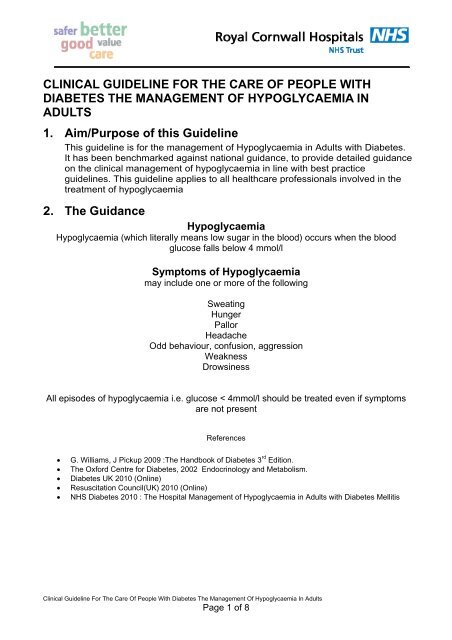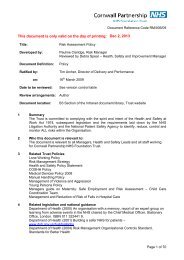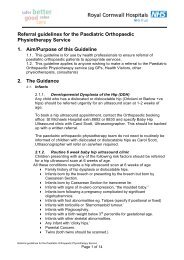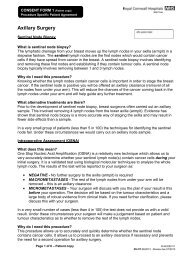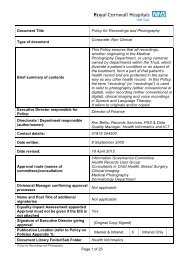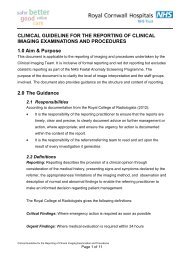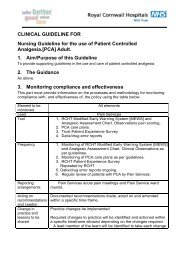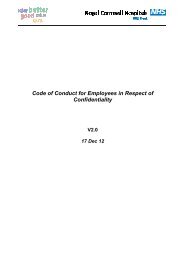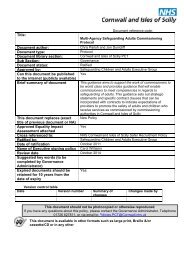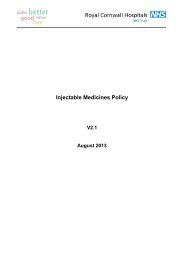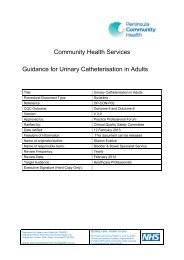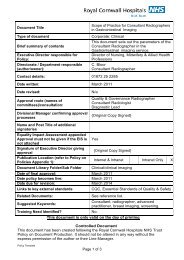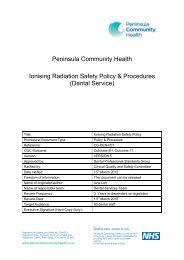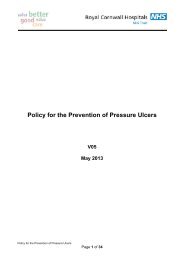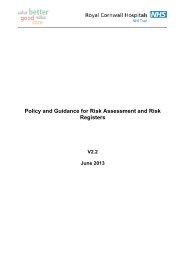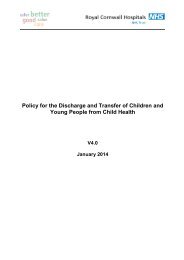Guidelines for the management of hypoglycaemia in adults
Guidelines for the management of hypoglycaemia in adults
Guidelines for the management of hypoglycaemia in adults
Create successful ePaper yourself
Turn your PDF publications into a flip-book with our unique Google optimized e-Paper software.
CLINICAL GUIDELINE FOR THE CARE OF PEOPLE WITH<br />
DIABETES THE MANAGEMENT OF HYPOGLYCAEMIA IN<br />
ADULTS<br />
1. Aim/Purpose <strong>of</strong> this Guidel<strong>in</strong>e<br />
This guidel<strong>in</strong>e is <strong>for</strong> <strong>the</strong> <strong>management</strong> <strong>of</strong> Hypoglycaemia <strong>in</strong> Adults with Diabetes.<br />
It has been benchmarked aga<strong>in</strong>st national guidance, to provide detailed guidance<br />
on <strong>the</strong> cl<strong>in</strong>ical <strong>management</strong> <strong>of</strong> <strong>hypoglycaemia</strong> <strong>in</strong> l<strong>in</strong>e with best practice<br />
guidel<strong>in</strong>es. This guidel<strong>in</strong>e applies to all healthcare pr<strong>of</strong>essionals <strong>in</strong>volved <strong>in</strong> <strong>the</strong><br />
treatment <strong>of</strong> <strong>hypoglycaemia</strong><br />
2. The Guidance<br />
Hypoglycaemia<br />
Hypoglycaemia (which literally means low sugar <strong>in</strong> <strong>the</strong> blood) occurs when <strong>the</strong> blood<br />
glucose falls below 4 mmol/l<br />
Symptoms <strong>of</strong> Hypoglycaemia<br />
may <strong>in</strong>clude one or more <strong>of</strong> <strong>the</strong> follow<strong>in</strong>g<br />
Sweat<strong>in</strong>g<br />
Hunger<br />
Pallor<br />
Headache<br />
Odd behaviour, confusion, aggression<br />
Weakness<br />
Drows<strong>in</strong>ess<br />
All episodes <strong>of</strong> <strong>hypoglycaemia</strong> i.e. glucose < 4mmol/l should be treated even if symptoms<br />
are not present<br />
References<br />
<br />
<br />
<br />
<br />
<br />
G. Williams, J Pickup 2009 :The Handbook <strong>of</strong> Diabetes 3 rd Edition.<br />
The Ox<strong>for</strong>d Centre <strong>for</strong> Diabetes, 2002 Endocr<strong>in</strong>ology and Metabolism.<br />
Diabetes UK 2010 (Onl<strong>in</strong>e)<br />
Resuscitation Council(UK) 2010 (Onl<strong>in</strong>e)<br />
NHS Diabetes 2010 : The Hospital Management <strong>of</strong> Hypoglycaemia <strong>in</strong> Adults with Diabetes Mellitis<br />
Cl<strong>in</strong>ical Guidel<strong>in</strong>e For The Care Of People With Diabetes The Management Of Hypoglycaemia In Adults<br />
Page 1 <strong>of</strong> 8
Initial Management <strong>of</strong> Hypoglycaemia<br />
(For patients who are enterally fed whilst nil by mouth see page 3)<br />
Is <strong>the</strong> peripheral blood glucose < 4 mmol/l<br />
Yes<br />
If <strong>the</strong> peripheral blood glucose < 2.8 mmol/l a<br />
venous sample must be obta<strong>in</strong>ed as per policy<br />
Cl<strong>in</strong>ical guidel<strong>in</strong>e <strong>for</strong> use <strong>of</strong> Nova Stat Strip blood<br />
glucose meter<br />
(Do not wait <strong>for</strong> <strong>the</strong> result be<strong>for</strong>e treat<strong>in</strong>g <strong>the</strong> hypo)<br />
No<br />
Hypoglycaemia <strong>management</strong> is not<br />
appropriate.<br />
BUT consider o<strong>the</strong>r reasons <strong>for</strong><br />
symptoms and review soon as blood<br />
glucose may be dropp<strong>in</strong>g rapidly<br />
Is <strong>the</strong> patient conscious and able to swallow?<br />
Yes No<br />
1. In<strong>for</strong>m medical staff<br />
2. Give 15 - 20 grams <strong>of</strong> fast act<strong>in</strong>g carbohydrate<br />
15-20 grams is<br />
150-200 mls <strong>of</strong> pure fruit juice<br />
90-120 mls <strong>of</strong> Lucozade orig<strong>in</strong>al<br />
150-200 mls <strong>of</strong> Coca Cola orig<strong>in</strong>al<br />
30-40 mls (to be diluted) <strong>of</strong> Ribena orig<strong>in</strong>al<br />
4 - 5 Glucotabs<br />
3 - 4 heaped teaspoons <strong>of</strong> sugar dissolved <strong>in</strong><br />
a non milky dr<strong>in</strong>k<br />
Or<br />
3. If <strong>the</strong> patient is Nil By Mouth<br />
1½ - 2 tubes <strong>of</strong> Glucose oral gel squeezed <strong>in</strong>to <strong>the</strong><br />
side <strong>of</strong> <strong>the</strong> mouth. (not swallowed).Rubb<strong>in</strong>g <strong>the</strong> cheek<br />
can aid absorption.<br />
4. Repeat peripheral blood glucose <strong>in</strong> 10 m<strong>in</strong>utes.<br />
N.B. follow this process twice only <strong>the</strong>n seek medical<br />
review <strong>for</strong> Intravenous glucose / IM Glucagon<br />
1. In<strong>for</strong>m medical staff<br />
2. Intravenous <strong>in</strong>jection <strong>of</strong> 50 mls <strong>of</strong> 10% glucose<br />
(must be prescribed)<br />
3. Fur<strong>the</strong>r <strong>in</strong>travenous <strong>in</strong>jection 50mls <strong>of</strong> 10%<br />
glucose every m<strong>in</strong>ute until <strong>the</strong> glucose is > 4 mmol/l<br />
(must be prescribed) (give up to 150 mls <strong>in</strong> total)<br />
Or<br />
4. 1 mg <strong>of</strong> glucagon s.c, or i.m. (must be prescribed)<br />
*<br />
Then<br />
5. Repeat peripheral blood glucose <strong>in</strong> 10 m<strong>in</strong>utes.<br />
<br />
<br />
Glucagon may be <strong>in</strong>effective <strong>in</strong> episodes <strong>of</strong><br />
hypo precipitated by <strong>the</strong> <strong>in</strong>gestion <strong>of</strong> alcohol<br />
N.B. follow this process twice only <strong>the</strong>n seek<br />
medical review<br />
Is <strong>the</strong> peripheral blood glucose< 4mmol/l<br />
Yes<br />
If <strong>the</strong> patient is conscious and not nil by mouth<br />
1. Follow up with long act<strong>in</strong>g carbohydrate i.e. 2 pla<strong>in</strong> biscuits or 1 slice <strong>of</strong> toast or 200-300 mls <strong>of</strong> milk (Double<br />
<strong>the</strong> amount if Glucagon used)<br />
Or<br />
2. A meal with carbohydrate if <strong>the</strong> next meal is due.<br />
If <strong>the</strong> patient rema<strong>in</strong>s unconscious or is nil by mouth obta<strong>in</strong> medical review<br />
Guidance Notes<br />
Do not withhold <strong>in</strong>sul<strong>in</strong> / medication. Once <strong>the</strong> <strong>hypoglycaemia</strong> has been treated as per <strong>the</strong> above<br />
guidel<strong>in</strong>es, adm<strong>in</strong>ister usual <strong>in</strong>sul<strong>in</strong> / medication to prevent rebound hyperglycaemia.<br />
Intravenous Insul<strong>in</strong> Infusion is not a treatment <strong>for</strong> <strong>hypoglycaemia</strong><br />
Note that hypo due to overdose <strong>of</strong> oral hypoglycaemics/<strong>in</strong>sul<strong>in</strong>/ may be prolonged and may require<br />
prolonged dextrose <strong>in</strong>fusion<br />
Cont<strong>in</strong>ue regular blood glucose monitor<strong>in</strong>g <strong>for</strong> at least 24 -48 hours. Long term <strong>management</strong> - medical<br />
review <strong>of</strong> <strong>in</strong>sul<strong>in</strong> / medication / cause <strong>of</strong> repeated episodes <strong>of</strong> <strong>hypoglycaemia</strong>.<br />
For fur<strong>the</strong>r advice refer to Diabetes In-Patient Specialist Nurse bleep 2205 / #3104 or <strong>the</strong> Endocr<strong>in</strong>e team<br />
No<br />
Cl<strong>in</strong>ical Guidel<strong>in</strong>e For The Care Of People With Diabetes The Management Of Hypoglycaemia In Adults<br />
Page 2 <strong>of</strong> 8
Initial Management <strong>of</strong> Hypoglycaemia<br />
Adult <strong>in</strong>patients with Diabetes who are be<strong>in</strong>g ENTERALLY fed whilst nil by mouth<br />
Is <strong>the</strong> peripheral blood glucose < 4 mmol/l<br />
Yes<br />
No<br />
If <strong>the</strong> peripheral blood glucose < 2.8 mmol/l a<br />
venous sample must be obta<strong>in</strong>ed as per policy<br />
Cl<strong>in</strong>ical guidel<strong>in</strong>e <strong>for</strong> use <strong>of</strong> Nova Stat Strip<br />
blood glucose meter<br />
(Do not wait <strong>for</strong> <strong>the</strong> result be<strong>for</strong>e treat<strong>in</strong>g <strong>the</strong><br />
hypo)<br />
Hypoglycaemia <strong>management</strong> is not<br />
appropriate.<br />
BUT consider o<strong>the</strong>r reasons <strong>for</strong> symptoms<br />
and review soon as blood glucose may be<br />
dropp<strong>in</strong>g rapidly<br />
1. In<strong>for</strong>m medical staff<br />
2. Give 15 - 20 grams <strong>of</strong> fast act<strong>in</strong>g carbohydrate via <strong>the</strong> enteral feed<strong>in</strong>g tube (by gravity– use a<br />
purple syr<strong>in</strong>ge as per NPSA).<br />
<br />
<br />
<br />
15-20 grams is<br />
45-60 mls Juice style Supplement Dr<strong>in</strong>k (ProvidExtra Juice Dr<strong>in</strong>k, Ensure Plus Juice or<br />
Fortijuice)<br />
30-40 mls <strong>of</strong> Ribena orig<strong>in</strong>al (do not dilute)<br />
3-4 heaped teaspoons <strong>of</strong> sugar dissolved <strong>in</strong> sterile water<br />
<br />
flush with 50mls <strong>of</strong> sterile water<br />
Then<br />
N.B. follow this process twice only <strong>the</strong>n seek medical review <strong>for</strong> Intravenous glucose / IM Glucagon<br />
Repeat peripheral blood glucose <strong>in</strong> 10 m<strong>in</strong>s<br />
Is <strong>the</strong> peripheral blood glucose< 4mmol/l<br />
Yes No<br />
<br />
<br />
1. Follow up with long act<strong>in</strong>g carbohydrate via enteral feed<strong>in</strong>g tube:<br />
Restart Enteral feed<br />
or<br />
give 100 mls <strong>of</strong> Milky Supplement dr<strong>in</strong>k<br />
(Fresub<strong>in</strong> Energy Dr<strong>in</strong>k, Ensure Plus Milk Shake Style, Fortisip)<br />
CC/BH<br />
Guidance Notes<br />
Do not use Oral Glucose Gel due to risk <strong>of</strong> aspiration<br />
Avoid us<strong>in</strong>g fizzy dr<strong>in</strong>ks or fruit juice as <strong>the</strong>se can damage <strong>the</strong> tube<br />
Do not withhold <strong>in</strong>sul<strong>in</strong> / medication. Once <strong>the</strong> <strong>hypoglycaemia</strong> has been treated as per <strong>the</strong> above guidel<strong>in</strong>es,<br />
adm<strong>in</strong>ister usual <strong>in</strong>sul<strong>in</strong> / medication to prevent rebound hyperglycaemia.<br />
Cont<strong>in</strong>ue regular blood glucose monitor<strong>in</strong>g <strong>for</strong> at least 24 -48 hours. Long term <strong>management</strong> - medical review<br />
<strong>of</strong> <strong>in</strong>sul<strong>in</strong> / medication / cause <strong>of</strong> repeated episodes <strong>of</strong> <strong>hypoglycaemia</strong>.<br />
Intravenous Insul<strong>in</strong> Infusion is not a treatment <strong>for</strong> <strong>hypoglycaemia</strong><br />
Note that prolonged hypo may require prolonged dextrose <strong>in</strong>fusion<br />
For fur<strong>the</strong>r advice refer to Diabetes Dietitian bleep 2955 / #4569 / #2409<br />
Cl<strong>in</strong>ical Guidel<strong>in</strong>e For The Care Of People With Diabetes The Management Of Hypoglycaemia In Adults<br />
Page 3 <strong>of</strong> 8
3. Monitor<strong>in</strong>g compliance and effectiveness<br />
Element to be<br />
monitored<br />
Lead<br />
Tool<br />
Frequency<br />
Report<strong>in</strong>g<br />
arrangements<br />
Act<strong>in</strong>g on<br />
recommendations<br />
and Lead(s)<br />
Compliance<br />
Specialist Adult In-Patient Diabetes Team<br />
Patient Documentation<br />
Adult diabetes In-patients who are reviewed by <strong>the</strong> specialist<br />
diabetes team who have required <strong>management</strong> <strong>of</strong> Hypoglycaemia<br />
Non compliance will be reported to <strong>the</strong> ward /area manager.<br />
Repeated non compliance will be reported via Datix<br />
Ward / Area managers will undertake subsequent<br />
recommendations and action plann<strong>in</strong>g <strong>for</strong> any or all deficiencies<br />
and recommendations with<strong>in</strong> reasonable timeframes <strong>for</strong> <strong>the</strong>ir areas<br />
The Specialist Adult In-Patient Diabetes Team will undertake any<br />
trust wide recommendations and action plann<strong>in</strong>g <strong>for</strong> any or all<br />
deficiencies and recommendations with<strong>in</strong> reasonable timeframes<br />
Change <strong>in</strong><br />
practice and<br />
lessons to be<br />
shared<br />
Lesson learned or changes to practice will be shared with all <strong>the</strong><br />
relevant stakeholders<br />
4. Equality and Diversity<br />
4.1. This document complies with <strong>the</strong> Royal Cornwall Hospitals NHS Trust service<br />
Equality and Diversity statement.<br />
4.2. Equality Impact Assessment<br />
The Initial Equality Impact Assessment Screen<strong>in</strong>g Form is at Appendix 2.<br />
Cl<strong>in</strong>ical Guidel<strong>in</strong>e For The Care Of People With Diabetes The Management Of Hypoglycaemia In Adults<br />
Page 4 <strong>of</strong> 8
Appendix 1. Governance In<strong>for</strong>mation<br />
Document Title<br />
Date Issued/Approved: 19 Jul 12<br />
Cl<strong>in</strong>ical Guidel<strong>in</strong>e For The Care Of People<br />
With Diabetes The Management Of<br />
Hypoglycaemia In Adults<br />
Date Valid From: 19 Jul 12<br />
Date <strong>for</strong> Review: 1 July 2015<br />
Directorate / Department responsible<br />
(author/owner):<br />
Amanda Veall Cl<strong>in</strong>ical Nurse Specialist<br />
Diabetes<br />
Contact details: 01872 253104<br />
Brief summary <strong>of</strong> contents<br />
Treatment <strong>for</strong> <strong>hypoglycaemia</strong> <strong>in</strong> <strong>adults</strong> with<br />
diabetes<br />
Suggested Keywords:<br />
Target Audience<br />
Executive Director responsible <strong>for</strong><br />
Policy:<br />
Diabetes<br />
RCHT PCT CFT<br />
<br />
Medical Director<br />
Date revised: April 2012<br />
This document replaces (exact title <strong>of</strong><br />
previous version):<br />
Approval route (names <strong>of</strong><br />
committees)/consultation:<br />
Divisional Manager confirm<strong>in</strong>g<br />
approval processes<br />
<strong>Guidel<strong>in</strong>es</strong> For The Management Of<br />
Hypoglycaemia In Adults<br />
Diabetes In-Patient Specialist Nurses,<br />
Specialist Diabetes Dietitian, Consultant<br />
Endocr<strong>in</strong>ologists<br />
Rowena Green<br />
Name and Post Title <strong>of</strong> additional<br />
signatories<br />
Signature <strong>of</strong> Executive Director giv<strong>in</strong>g<br />
approval<br />
Publication Location (refer to Policy<br />
on Policies – Approvals and<br />
Ratification):<br />
Document Library Folder/Sub Folder<br />
Not Required<br />
{Orig<strong>in</strong>al Copy Signed}<br />
Internet & Intranet Intranet Only<br />
Cl<strong>in</strong>ical/ Endocr<strong>in</strong>e And Diabetes<br />
L<strong>in</strong>ks to key external standards NSF Diabetes Standards 7 and 8<br />
Related Documents:<br />
NHS Diabetes: The Hospital Management<br />
Cl<strong>in</strong>ical Guidel<strong>in</strong>e For The Care Of People With Diabetes The Management Of Hypoglycaemia In Adults<br />
Page 5 <strong>of</strong> 8
Tra<strong>in</strong><strong>in</strong>g Need Identified?<br />
<strong>of</strong> Hypoglycaemia <strong>in</strong> Adults with Diabetes<br />
Mellitus March 2010<br />
Yes / Learn<strong>in</strong>g and Development have been<br />
<strong>in</strong><strong>for</strong>med via email 15/05/2012<br />
Version Control Table<br />
Date<br />
March<br />
2010<br />
30 April<br />
2012<br />
Version<br />
No<br />
V1.0 Initial Issue<br />
V2.0<br />
Summary <strong>of</strong> Changes<br />
Amendment to quantities <strong>of</strong> CHO and<br />
enterally fed patients <strong>in</strong> accordance with<br />
national guidel<strong>in</strong>e<br />
Changes Made by<br />
(Name and Job Title)<br />
Amanda Veall<br />
Cl<strong>in</strong>ical Nurse<br />
Specialist Diabetes<br />
Amanda Veall<br />
Cl<strong>in</strong>ical Nurse<br />
Specialist Diabetes<br />
All or part <strong>of</strong> this document can be released under <strong>the</strong> Freedom <strong>of</strong> In<strong>for</strong>mation<br />
Act 2000<br />
This document is to be reta<strong>in</strong>ed <strong>for</strong> 10 years from <strong>the</strong> date <strong>of</strong> expiry.<br />
This document is only valid on <strong>the</strong> day <strong>of</strong> pr<strong>in</strong>t<strong>in</strong>g<br />
Controlled Document<br />
This document has been created follow<strong>in</strong>g <strong>the</strong> Royal Cornwall Hospitals NHS Trust<br />
Policy on Document Production. It should not be altered <strong>in</strong> any way without <strong>the</strong><br />
express permission <strong>of</strong> <strong>the</strong> author or <strong>the</strong>ir L<strong>in</strong>e Manager.<br />
Cl<strong>in</strong>ical Guidel<strong>in</strong>e For The Care Of People With Diabetes The Management Of Hypoglycaemia In Adults<br />
Page 6 <strong>of</strong> 8
Appendix 2.Initial Equality Impact Assessment Screen<strong>in</strong>g Form<br />
Name <strong>of</strong> service, strategy, policy or project (hereafter referred to as policy) to be<br />
assessed: Cl<strong>in</strong>ical Guidel<strong>in</strong>e For The Care Of People With Diabetes The Management<br />
Of Hypoglycaemia In Adults<br />
Directorate and service area: Diabetes<br />
Is this a new or exist<strong>in</strong>g Procedure?<br />
Exist<strong>in</strong>g<br />
Telephone: 01872 253104<br />
Name <strong>of</strong> <strong>in</strong>dividual complet<strong>in</strong>g<br />
assessment: Amanda Veall<br />
1. Policy Aim* To provide detailed guidance on <strong>the</strong> cl<strong>in</strong>ical <strong>management</strong> <strong>of</strong><br />
<strong>hypoglycaemia</strong> <strong>in</strong> l<strong>in</strong>e with best practice guidel<strong>in</strong>es.<br />
2. Policy Objectives* To provide a consistent approach to <strong>the</strong> <strong>management</strong><br />
<strong>of</strong> <strong>hypoglycaemia</strong> at RCHT sites.<br />
3. Policy – <strong>in</strong>tended<br />
Outcomes*<br />
4. How will you measure<br />
<strong>the</strong> outcome?<br />
5. Who is <strong>in</strong>tended to<br />
benefit from <strong>the</strong> Policy?<br />
<br />
<br />
<br />
To ma<strong>in</strong>ta<strong>in</strong> patient safety and improve outcomes <strong>for</strong><br />
patients experienc<strong>in</strong>g <strong>hypoglycaemia</strong> whilst <strong>in</strong>patients<br />
at RCHT sites<br />
Consistent <strong>management</strong> <strong>of</strong> <strong>hypoglycaemia</strong> at RCHT<br />
sites.<br />
Prompt and safe <strong>management</strong> <strong>of</strong> hypoglycaemic<br />
episodes and follow up care.<br />
Audit<br />
Datix Report<strong>in</strong>g<br />
Review <strong>of</strong> nurs<strong>in</strong>g/ medical documentation as required<br />
All patients with diabetes who experience <strong>hypoglycaemia</strong> <strong>in</strong><br />
hospital at RCHT sites.<br />
6a. Is consultation<br />
required with <strong>the</strong><br />
work<strong>for</strong>ce, equality<br />
groups, local <strong>in</strong>terest<br />
groups etc. around this<br />
policy?<br />
b. If yes, have <strong>the</strong>se<br />
groups been consulted?<br />
c. Please list any groups<br />
who have been consulted<br />
about this procedure.<br />
Yes<br />
Yes<br />
Diabetes Inpatient Specialist Nurses<br />
Consultant Endocr<strong>in</strong>ologists<br />
Diabetes Dietician<br />
*Please see Glossary<br />
7. The Impact<br />
Please complete <strong>the</strong> follow<strong>in</strong>g table us<strong>in</strong>g ticks. You should refer to <strong>the</strong> EA guidance notes<br />
<strong>for</strong> areas <strong>of</strong> possible impact and also <strong>the</strong> Glossary if needed.<br />
Where you th<strong>in</strong>k that <strong>the</strong> policy could have a positive impact on any <strong>of</strong> <strong>the</strong> equality<br />
group(s) like promot<strong>in</strong>g equality and equal opportunities or improv<strong>in</strong>g relations<br />
with<strong>in</strong> equality groups, tick <strong>the</strong> ‘Positive impact’ box.<br />
Where you th<strong>in</strong>k that <strong>the</strong> policy could have a negative impact on any <strong>of</strong> <strong>the</strong> equality<br />
group(s) i.e. it could disadvantage <strong>the</strong>m, tick <strong>the</strong> ‘Negative impact’ box.<br />
Cl<strong>in</strong>ical Guidel<strong>in</strong>e For The Care Of People With Diabetes The Management Of Hypoglycaemia In Adults<br />
Page 7 <strong>of</strong> 8
Where you th<strong>in</strong>k that <strong>the</strong> policy has no impact on any <strong>of</strong> <strong>the</strong> equality group(s) listed<br />
below i.e. it has no effect currently on equality groups, tick <strong>the</strong> ‘No impact’ box.<br />
Equality<br />
Group<br />
Age<br />
Positive<br />
Impact<br />
Negative<br />
Impact<br />
No<br />
Impact<br />
x<br />
Reasons <strong>for</strong> decision<br />
Disability<br />
x<br />
Religion or<br />
belief<br />
Gender<br />
x<br />
x<br />
Transgender<br />
x<br />
Pregnancy/<br />
Maternity<br />
Race<br />
x<br />
x<br />
Sexual<br />
Orientation<br />
Marriage / Civil<br />
Partnership<br />
x<br />
x<br />
You will need to cont<strong>in</strong>ue to a full Equality Impact Assessment if <strong>the</strong> follow<strong>in</strong>g have<br />
been highlighted:<br />
A negative impact and<br />
No consultation (this excludes any policies which have been identified as not<br />
requir<strong>in</strong>g consultation).<br />
8. If <strong>the</strong>re is no evidence that <strong>the</strong> policy<br />
promotes equality, equal opportunities<br />
or improved relations - could it be<br />
adapted so that it does? How?<br />
Full statement <strong>of</strong> commitment to policy <strong>of</strong><br />
equal opportunities is <strong>in</strong>cluded <strong>in</strong> <strong>the</strong> policy<br />
Please sign and date this <strong>for</strong>m.<br />
Keep one copy and send a copy to Matron, Equality, Diversity and Human Rights,<br />
c/o Royal Cornwall Hospitals NHS Trust, Human Resources Department, Chyvean<br />
House, Penvent<strong>in</strong>nie Lane, Truro, Cornwall, TR1 3LJ<br />
A summary <strong>of</strong> <strong>the</strong> results will be published on <strong>the</strong> Trust’s web site.<br />
Signed ________Amanda Veall________________________________<br />
Date _____10-07-2012____________________________________<br />
Cl<strong>in</strong>ical Guidel<strong>in</strong>e For The Care Of People With Diabetes The Management Of Hypoglycaemia In Adults<br />
Page 8 <strong>of</strong> 8


